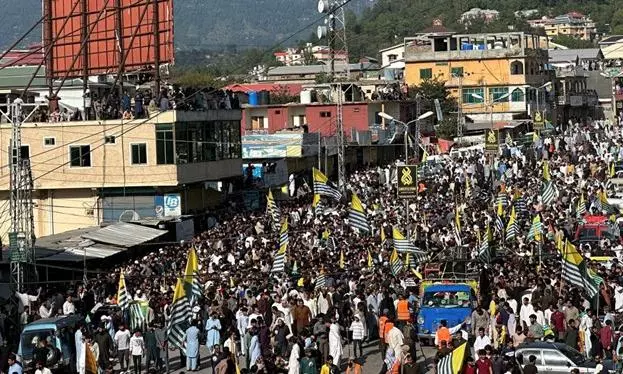
Gen Z fury over education reforms sparks PoK protests against Sharif govt
From fee hikes to flawed e-marking, youth in Pakistan-occupied Kashmir take to the streets as frustration over education and governance deepens

Weeks after Pakistan-Occupied Kashmir (PoK) was jolted by violent unrest, a fresh wave of demonstrations has swept through the region, this time driven by Gen Z students protesting education reforms. However, what started as a peaceful outcry over rising fees and flawed evaluations has evolved into a wider movement against the Shehbaz Sharif government, laying bare growing anger among young people in the restive territory.
Also read | PoK: 12 civilians killed, 200 injured as Pakistan forces open fire at protestors
The latest protests, which began earlier this month, were largely peaceful until an unidentified gunman opened fire on a group of students, injuring one. Videos circulating on social media show a man shooting at protesters in Muzaffarabad, causing panic in the area. Reports claim the incident occurred in the presence of police personnel, though the footage could not be verified.
Fees, reforms fuel outrage
The shooting marked a turning point. Furious students responded by burning tyres, vandalising property, and chanting anti-government slogans, echoing the Gen Z-led agitations seen recently in Nepal and Bangladesh.
The unrest first erupted at a leading university in Muzaffarabad, where students rallied against steep fee hikes and demanded better facilities. As demonstrations grew, the administration moved swiftly to impose a ban on political activities on campus.
A similar protest had flared in January 2024, when students alleged that lakhs of rupees were being collected every three or four months under the guise of semester fees. At the time, teaching and administrative staff had also joined in, pressing for long-pending salary revisions.
This round of protests has now drawn in intermediate students as well. Their anger centres on the introduction of a new e-marking, or digital assessment, system for matriculation and intermediate exams in the current academic year.
From classrooms to streets
When the results of the first-year intermediate exams were announced on October 30, after a six-month delay, students erupted in outrage, claiming they had been unfairly marked down due to the new system. According to local reports, some students were even declared passed in subjects for which they never appeared.
Though the government has yet to issue a clarification, the education board in Mirpur has formed a committee to review the e-marking process. Protesters are also demanding a waiver of the steep rechecking fee of Rs 1,500 per paper — meaning students who wish to contest marks in all seven subjects would need to pay Rs 10,500.
The agitation has since spilled beyond PoK. Intermediate students in Lahore staged a sit-in last month outside the Lahore Press Club, expressing solidarity with their peers in the region.
What began as an academic protest has now grown into a broader expression of discontent. Complaints about collapsing infrastructure, inadequate healthcare, and poor transport have deepened the frustration of PoK’s youth.
JAAC backing intensifies unrest
Adding momentum to the movement is the support of the powerful Joint Awami Action Committee (JAAC), which led the violent demonstrations in October.
Also read | PoK protests escalate: AAC calls for 'shutter-down' strike; govt clamps down
That earlier unrest had left over a dozen civilians dead and was fuelled by a charter of 30 demands, ranging from tax relief and flour subsidies to electricity concessions and the completion of stalled development projects.
When the Pakistani authorities attempted to quell the protests with gunfire, the anger quickly turned into a wider rebellion against military excesses under Army Chief Asim Munir and allegations of corruption, paralysing the region.
The standoff finally ended only after the Sharif government relented and signed an agreement with the demonstrators, conceding several of their major demands.

